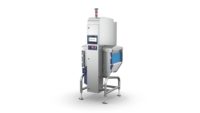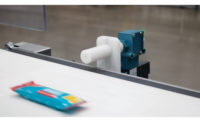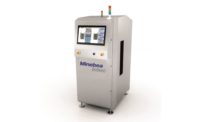Andersen and Sons Shelling takes pride in doing big business with small-town values. Founded in 1904, this fourth-generation, family-owned-and-operated company produces a variety of tree nuts that are sold nationwide at most major retailers, as well as internationally. Now processing more than 125 million pounds of nuts annually, Andersen’s ongoing focus on integrity and quality fuels their success, and five Mettler-Toledo Safeline x-ray inspection systems help ensure products always meet their high standards.
“Prior to 2017, we were sending all our nuts in bulk to contract packers that produced retail packs for our customers. When one of our biggest retailers told us they were having problems with their contract packer, they asked us to start private labeling retail packs ourselves in addition to processing,” says Mike Andersen, owner and vice president of sales at Andersen. “As we began planning our first retail packaging lines, we decided to add x-ray inspection and turned to Mettler-Toledo.”
“Our relationship with Mettler-Toledo Safeline goes way back. We purchased our first metal detector from them over 20 years ago, and we still use it today. We’ve tried working with other inspection equipment suppliers, but we’ve had so many bad experiences, we now only work with Mettler-Toledo,” continues Andersen. “Over the last few years, we’ve purchased four Safeline X33 x-ray systems, and then in 2021, our sales rep, Bay Area Packaging, recommended the advanced X36 for our newest line.”
Andersen’s new X36 x-ray inspection system is installed on a retail packaging line inspecting nuts in polyethylene pouches between 8 and 40 ounces in size. Capable of handling up to 125 packages per minute, Andersen is currently inspecting 58 packages per minute on average, which gives them room to grow. Bags of ‘good’ product are conveyed downstream to secondary packaging while any out-of-tolerance bags are removed from the line with a Mettler-Toledo pneumatic pusher reject device and then inspected by Andersen’s quality control team to identify and remedy any potential problems.
“Rocks are a huge concern in our industry,” says Mallory Daily, food safety manager at Andersen. “During harvesting, each tree is shaken so the nuts fall on the ground and are then mechanically gathered, so inevitably some rocks get scooped up. This means that a metal detector won’t cut it now that we’re responsible for final product quality on retail packs—x-ray systems can detect and remove far more foreign material.”
“Tree nuts are a particularly difficult product for most x-rays to inspect because their density is so close to that of a rock. We’ve turned our x-ray systems’ sensitivity way up so it can find even the smallest, most difficult-to-detect foreign material,” says Ryan Bughao, director of operations at Andersen. “The X36 in particular is incredibly accurate. It’s able to find contaminants far beyond other systems on the market. Once it even found a tiny wire that a nut had grown around. We were so impressed.”
Based in Vina, CA, Andersen processes walnuts, almonds, macadamia nuts, cashews, hazelnuts, pecans, and more. Their products are packaged into a variety of retail packs that go to market under both private labels and its Glenda’s Farmhouse brand.
“Since every type of nut is classified as a separate allergen, we take sanitation incredibly seriously here,” said Daily. “We do both dry cleaning and chemical cleaning to remove proteins during every changeover. Although our Mettler-Toledo x-rays are detecting finished products in sealed bags, we still deep clean the belts just in case there was a broken bag or spill. Overall, these systems are very easy to clean.”
Since Andersen’s packaging room can reach over 100 degrees Fahrenheit in the summer, they added an optional Mettler-Toledo air conditioning unit to their X36. This add-on helps ensure their x-ray system can run for long hours even in these very hot temperatures. “We haven’t had a single overheating issue on our X36. That is no small feat considering our challenging environment,” added Bughao.
“Another benefit of our Mettler-Toledo x-ray systems is the technology helps us confirm our graders and optical sorters are running correctly,” said Daily. “If one of our x-rays starts identifying lots of rocks or other foreign material, it alerts us to look for the source, whether the issue is coming from a supplier or upstream line equipment or something else, addressing the problem quickly helps us maximize product quality and line efficiencies.”
“Demand for our products is growing so fast, we’re currently building a 300,000-plus square foot building to add more retail packaging lines. We’ve already purchased another X36 x-ray system for the new plant,” concludes Andersen. “At the end of the day, we sleep better knowing our world-class Mettler-Toledo x-ray systems are protecting our final product quality.”




